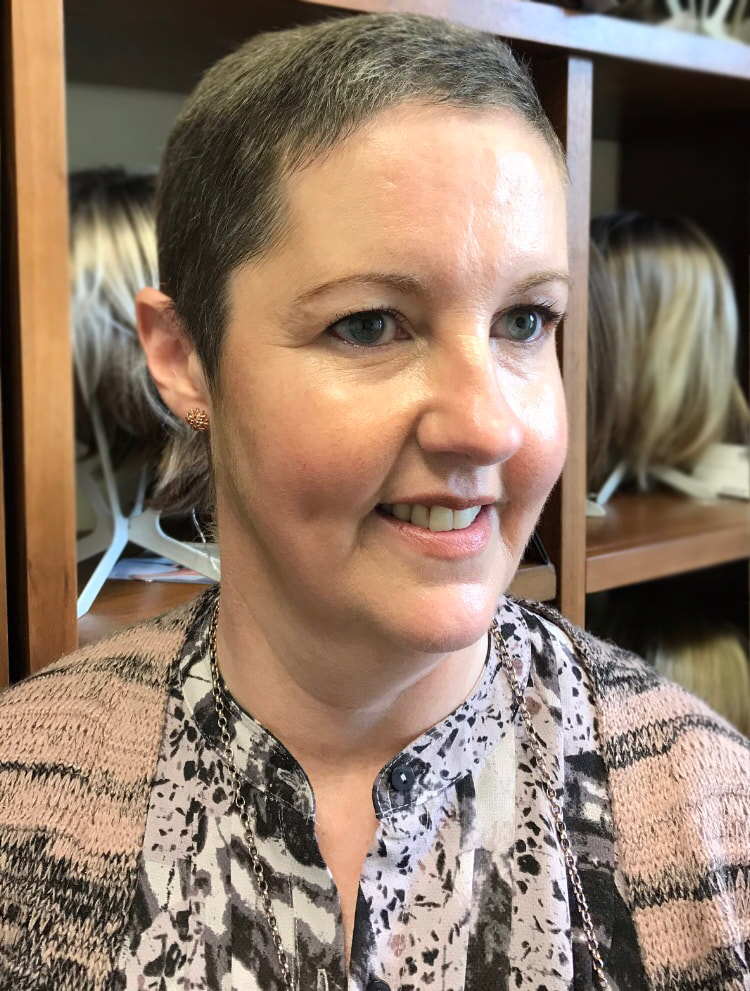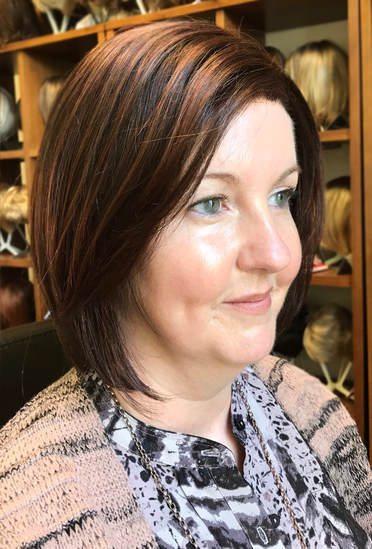|
Not everyone loses their hair when they have cancer treatment, but if it happens it can be very upsetting. Your hair will grow back once your treatment has ended, but in the meantime there are ways that can make hair loss easier to deal with. read more
About hair loss What is hair loss?In a normal scalp there are about 100,000 hairs. These are constantly growing, with old hairs falling out and being replaced by new ones. When an excessive amount of hair falls out over time, it is called alopecia. What causes hair loss?Some cancer treatments can cause hair loss. These include chemotherapy and radiotherapy. Treatment can damage the hair follicles, causing hair to fall out and preventing new hairs from growing. Hair loss from cancer treatment is usually temporary. Once the course of treatment is over, your hair will usually grow again within a short space of time. Your doctor and nurse will tell you if you are likely to have hair loss due to treatment.Cancer treatments and hair lossWhat types of cancer treatment cause hair loss?ChemotherapyThe amount of hair lost will usually depend on the type of drug or drugs used, the dose given, and your individual reaction to the drug. There are many kinds of drugs used in chemotherapy. Some of these will cause total hair loss, while others cause some hair loss. This can vary from a little thinning of your hair to greater hair loss. Other drugs cause hardly any hair loss at all. Even if it does not cause actual hair loss, chemotherapy can still damage your hair and make it brittle. RadiotherapyHair loss due to radiotherapy depends on which area of your body is being treated. Radiotherapy to the head often causes scalp hair loss. Depending on the dose of radiation to your head, your hair may change in colour and texture when it grows back. Hormone therapies or biological therapies Some hormone therapies or biological therapies can cause hair thinning. Usually this is quite mild and may not even be noticeable. How soon will my hair fall out?If hair loss does occur, it usually happens within a few weeks of the start of treatment. It can help to have your hair cut short before treatment or soon after it begins. The weight of long hair can pull on your scalp and may make your hair fall out faster. You may experience tingling or sensitivity of your scalp just before your hair starts to fall out. This is normal and may last a few days. When hair loss happens is usually gradual. It can fall out in clumps when shampooing or brushing. Sometimes you may find clumps of hair on your pillow or on your hairbrush. At this time, you might prefer to shave off your hair entirely. Most hairpiece suppliers provide this service. Underarm, body and pubic hair may be lost as well. Some drugs also cause loss of your eyelashes and eyebrows. Hair loss from cancer treatment is usually temporary. Usually hair grows back within a few weeks of finishing treatment. Can hair loss be prevented?In general you cannot prevent hair loss entirely if it is a side-effect of your particular treatment. But for some patients having certain types of chemotherapy, it may be possible to reduce or delay hair loss by using a ‘cold cap’. This is also known as scalp cooling. The treatment reduces blood flowing to your scalp for a short period so less of the drug reaches your scalp. While the cold cap can reduce the risk of hair loss, it does not always prevent it and it only blocks the action of certain drugs. It is also not suitable for all patients and not all hospitals offer this kind of treatment. Ask your doctor or nurse if it would be useful for you. When will my hair grow back?Usually hair grows back within a few weeks of finishing treatment. In some cases, it can start to regrow even before treatment has finished. After about 5 or 6 months, you should have a full covering of hair on your head. When it does grow back, hair can often be a different texture, style or colour. You may notice it is thicker and darker in colour. At first, fine downy hair appears on your scalp and then stronger hair develops. It grows at about one centimetre each month. Hair care during treatmentYour scalp may feel very sensitive to washing, combing or brushing during the short time when your hair is actually falling out. Here are some tips to help:
Do not be afraid to talk to your cancer nurse or medical social worker about your feelings. If your hospital does not have a medical social worker, your healthcare team can still give you advice and help arrange further emotional or psychological support if needed. If you prefer, you can also speak to a nurse in confidence by calling our Cancer Nurseline on Freephone 1800 200 700. Having a wig that you are happy with can make you feel better about losing your hair. See our section Wigs and hairpieces for information about getting a hairpiece. At the hospital, your nurse or a member of your healthcare team can advise you about where to go locally for your wig or hairpiece. If you need help with finding a wig supplier, ask at the hospital or call our Cancer Nurseline on 1800 200 700. Other people’s reactions to your hair lossWho you tell about your hair loss is an individual choice. Some people tell family and close friends, while others are comfortable to tell everyone. This decision may be affected by what type of headwear you choose to wear. For example, if you choose to wear scarves instead of a wig, your hair loss will be more obvious. People will respond to your hair loss in different ways. Sometimes their reactions can be hard to deal with. Usually most people are very supportive but sometimes there are others who can say things that are unhelpful and even hurtful without meaning to. It can help to be prepared for any kind of reaction. In fact, some people may just think you have a new hairstyle. Think about what you will say and to whom. The decision is yours but try not to withdraw from your social life and your friends because of your hair loss. Preparing childrenIf you have children of any age, you may wonder how and what to tell them. In general, children are less frightened when they know what is going on, even if they do not fully understand it. Despite it being difficult, talking to your children about your cancer will be helpful to all of you. It can prepare them for what to expect. It may help to explain that your hair will grow back and what you plan to wear while it is gone. Children will react differently and some may find it upsetting to see you without your hair. But talking about it openly in your home will help them feel more secure. Download our booket Talking to Children about Cancer: A Guide for Parents. Feeling better about the way you lookYou may feel that worrying about your appearance is silly when you are dealing with a cancer diagnosis, but some people feel happier and better able to cope when they feel they look the best they can. Take some time to experiment with make-up, wigs and clothes to see what suits you and makes you feel better. You can also get help and advice from the Look Good Feel Better workshops. These are run regularly in hospitals. The oncology unit can usually give you the telephone number of the contact person at your hospital. Or you can call the Cancer Nurseline on 1800 200 700 or visit a Daffodil Centre. Some general advice includes drawing attention away from your hair and towards your clothes and accessories. Wearing a brightly-coloured top or attractive jewellery, bags or shoes can help redirect the focus and boost your confidence. Will I lose my eyebrows and eyelashes?Hair loss can also occur in your eyebrows and eyelashes. Some people get thinning or complete loss of both. Others do not lose their eyebrows or eyelashes at all. If you do lose them, they can take between 6 months and a year to grow back. Eyelash loss can occur at any time but is more usual towards the end of treatment. It can also occur after treatment has finished. If you get thinning or hair loss of your eyebrows, you can use eyebrow products to help recreate your natural shape. There are many different products ranging from pencils to powders and also stencils that can be a useful guide. Advice is available from the cosmetic counters of department stores or more privately from your local beautician. Losing your eyelashes can affect how you look and feel. If your eyes cannot be protected by your eyelashes, they can become sore and uncomfortable. If this happens, speak to your cancer nurse about using eye drops. She will advise you, depending on your treatment. You can use eyeliner along the top of your eyelid to define your eye, which can work well. You could also try false eyelashes. Choose hypoallergenic eye products and have strict hygiene with the products to avoid the risk of infection. Wigs and hairpiecesIf you lose your hair, having a hairpiece that matches the colour, texture, style and shape of your own hair can make you feel more like yourself. At the hospital, your nurse or a member of your healthcare team can advise you about where to go locally for your wig or hairpiece. You can also call our Cancer Nurseline on 1800 200 700 for your nearest supplier. What are wigs and hairpieces made of?Wigs and hairpieces are made of either man-made fibres or real human hair. There are advantages and disadvantages to each type, so neither one is better than the other. It often comes down to personal preference. Fibre wigs can come in a huge variety of styles and colours and are easier to care for in general. But they may not have a ‘natural’ look and need to be replaced more often. Human hair looks more natural and can last longer but is more expensive. These wigs need more care than fibre wigs and must be styled after every wash. Where can I buy a hairpiece?Choose a wig supplier that has a special fitting service and a good selection of wigs. It helps if you are given plenty of time to fit on the wigs in a private room with lots of natural light. If you are unable to visit their shop, some wig suppliers offer home and hospital fittings too. Some can arrange to cut your hair before, during or after treatment and will advise you on aftercare. How much do hairpieces cost?The price of wigs and hairpieces can vary a good deal from company to company. The average price of a synthetic wig is between €350 and €500. For human hair, it can vary between €600 and €1000 and even higher. When checking prices, it is always good to shop around. Can I get financial help when buying a hairpiece?Usually you are only entitled to free or subsidised hairpieces if you have a medical card. You may be able to claim back some or all of the cost of a hairpiece through the tax system or through your medical insurance cover, if you have medical insurance. Medical card holdersIf you have a medical card, you will be entitled to an allowance towards the cost of your hairpiece. To claim you will need to get a letter from your cancer nurse or doctor before you buy the wig to say you need it for medical reasons. The amount you can claim will depend on the Health Service Executive (HSE) area in which you live. Your local health office or an HSE-registered wig supplier will be able to give you more information about the subsidy available and how to claim. Some wig suppliers will fill in the paperwork for you. A medical social worker can also give you more information on your entitlements. No health coverIf you do not have a medical card or private insurance, you can claim tax back on any hairpieces you buy. Because hairpieces are regarded as a medical expense, you must fill in the MED1 form when claiming. For more details, contact your local tax office (Revenue Commissioners). Medical insuranceContact your health insurer for full details on your own medical cover. Some health insurers will cover a certain amount of the cost of a hairpiece, depending on the type of cover you have. If your insurance does not cover the cost, you can claim it back as a medical expense on the MED1 form. If I don’t want a hairpiece, what else can I wear?There are many other types of headwear available. You can choose from scarves, bandanas, turbans and soft hats. There is also headwear for night-time wear that can be worn for warmth and comfort in bed. Thin-quilted cotton headliners are also available. These give height and shape when worn under hats and scarves. Alternative headwear is now available at hairpiece suppliers or online that is both comfortable and attractive. Cotton headwear tends to stay on a smooth scalp much better than polyester or nylon. If you feel that your face looks bare, there are also hair fringes, plaited braids and face-framers that can be worn with headwear to give the effect of hair beneath. If you decide not to cover your head, make sure you apply a very high protection sunscreen at all times. Caring for your hair when it grows backTreat your hair gently when it grows back. Use a soft brush and baby shampoo for the first six months or until there is good growth. After chemotherapy or radiotherapy, your hair may take a while to get back to its normal condition. It is best to wait for at least six months after treatment before colouring or perming your hair. Once it is long enough and your hair and scalp are in good condition, you can tint or perm it. Do not colour your hair if your scalp is scaly, sore, irritated, or if your hair is dryer than usual or rough to the touch. Speak to your hairdresser before you colour your hair for the first time after treatment. You could ask him or her about natural products such as henna and nonchemical colours. For example, vegetable-based products may be less harsh. Test the dye on a small, hidden area of hair first to make sure it will not damage your hair. What if my hair doesn’t grow back?A very small number of people have problems with hair regrowth after chemotherapy. If you are one of these, talk to your doctor. You could seek the advice of a trichologist. A trichologist is qualified to diagnose and treat hair and scalp disorders and diseases. Useful contactsGeneral support and adviceCancer NurselineCall our Cancer Nurseline and speak to one of our cancer nurses for confidential advice, support and information. The Cancer Nurseline is open Monday to Thursday 9am - 6pm and Friday 9am - 5pm. You can also email us on [email protected]; or visit our Online Community. Daffodil CentresOur Daffodil Centres are located in thirteen hospitals nationwide. The centers are staffed by cancer nurses and trained volunteers who provide confidential advice, support and information to anyone affected by cancer. Beauty and cosmetic adviceLook Good Feel Better Ireland. Free workshops and advice on how to manage the appearance-related side effects caused by cancer and its treatment. Advice about medical costs and benefitsHeath Service Executive (HSE)National Information Line: 1850 241 850 Email: [email protected] Website: www.hse.ie Dept of Social Protection – Information ServiceLoCall: 1890 66 22 44 Email: [email protected] Website: www.welfare.ie Citizens InformationInformation on public services and entitlements in Ireland. Citizens Information phone service: 0761 07 4000 Website: http://www.revenue.ie Information on getting tax back on medical expensesRevenue CommissionersTel: 1890 333 425 (Dublin region) 1890 44 44 25 (South and South East) 1890 777 425 (Border, Midlands, West) 1890 222 425 (South West)
0 Comments
Your comment will be posted after it is approved.
Leave a Reply. |
Bernie Murray16 years experience. Categories
All
|



 RSS Feed
RSS Feed